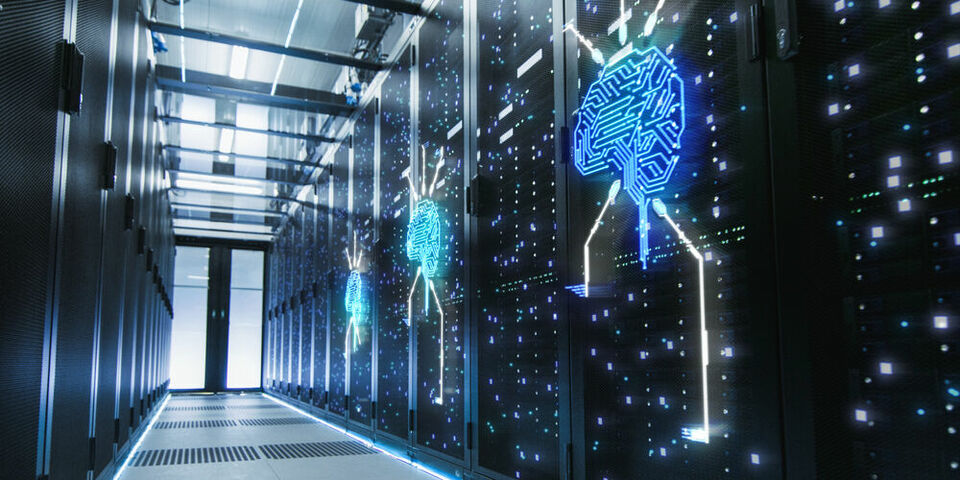HPC Lab helps with computing problems
In many cases, a standard laptop won’t suffice if you need to perform a computer simulation for your research project, or if you’re conducting an experiment with artificial intelligence. That is why the HPC Lab was established last year. Here, you’ll receive help optimizing your code, and you will be granted access to supercomputers in the ‘cloud.’ If you would like to find out more, you’re welcome to stop by at Hubble next Friday, July the 8th, for a lunch and a presentation on what the HPC Lab has to offer.
Up until the late 1980s, it was only natural that you needed a centralized computer to carry out complex computations. At the time, TU/e’s Computing Center was located in the Laplace (currently Neuron) building, which, very fittingly, will soon accommodate EAISI. The Laplace building housed several large computers, and communication with these computers took place via stacks of punch cards. Over the course of the following decades, the university’s digital computation became increasingly decentralized, and today all staff members and students own a laptop that’s more powerful than those wonder computers in the Computing Center.
Still, when it comes to scientific progress, an increasing number of fields strongly depend on computer simulations and the use of artificial intelligence. ‘To compete is to compute,’ as they say at the High Performance Computing (HPC) Lab. If you want to process large amounts of data or carry out extremely complex computations, a standard laptop or PC won’t suffice. Even though TU/e no longer has a centralized computing facility, several groups and departments still own specialized equipment, Patrick Anderson says. The professor in Polymer Technology is co-founder and scientific director of the HPC Lab.
“TU/e’s computing capacity is very scattered and there was no real community where users could share their experiences and knowledge. That’s why IMS, EAISI and seven departments decided in 2020 set up an organization, the HPC Lab, that helps scientists and students carry out their computations. To start, we focus specifically on ‘cloud computing.’”
Supercomputer
TU/e’s decision to set up the HPC Lab and not to acquire a supercomputer, like TU Delft did, is the better option, according Chief Information Officer and ‘digital director’ of the HPC Lab Bart Luijten. “A computer like that starts to become outdated the next day, which is why you need to put it to very good use if you want to make an investment like that profitable. On top of that, every computing problem makes different demands on a supercomputer, and that problem too can be mitigated by making flexible use of external computer facilities.” He emphasizes that the HPC Lab should be considered as an initiative “for and by scientists, in close collaboration with the experts at IMS.”
For several years now, incidentally, TU/e has been using the supercomputers of SURFsara in Amsterdam to carry out complex computations, Anderson explains. “A user won’t notice whether a computer is located next door or somewhere across the world, and we very much think from the perspective of the user.” Users can go to the HPC Lab if they need assistance with rewriting a code to such an extent that it runs more efficiently on a supercomputer, but also for advice on applications and for help with gaining access to certain facilities. “Sometimes you need to submit a proposal to NWO for that, but we also bought computing time that we can distribute within TU/e.”
The focus on cloud computing does not alter the fact that consideration is also being given to purchasing local hardware, says Richard Zoontjens, lead of the HPC Lab. “Ultimately, we are looking for the best solutions for the right questions, based on the wishes of the researcher. Such a solution can therefore also mean that we still opt for a local HPC implementation because of, for example, the costs or licenses.”
Informative meeting
If you think that the HPC Lab can help you with your research, you’re more than welcome to come to Hubble at 11:30 hrs. this Friday for an early lunch followed by an informative meeting in the Corona Hall. There, HPC Lab employees will inform you about the possibilities the lab has to offer. In addition, users such as students from University Racing Eindhoven (URE) and Solar Team Eindhoven (STE), and scientists from diverse fields such as quantum physics, engineering and biomechanics will share their experiences. The meeting will close with drinks. You don’t need to register.



Discussion